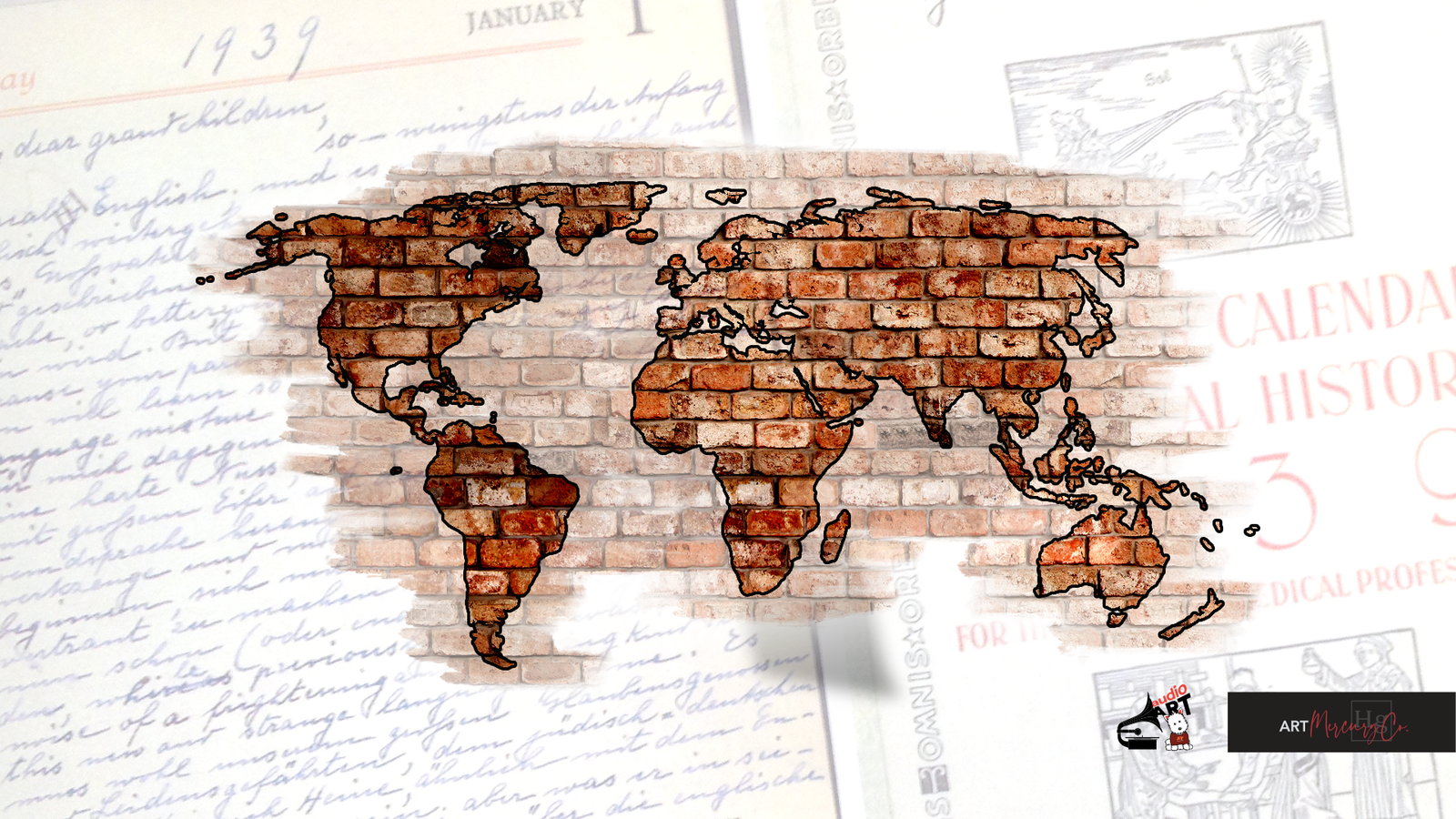
The Berlin Diaries Audio Drama: Resource Materials
With the help of The Oregon Jewish Museum and Center for Holocaust Education, we have created a resources page. Below is a list of supplemental reading options as well as a program created by OJMCHE. If you are as fascinated as we are about the history and themes in The Berlin Diaries or would like to learn more about the Holocaust, we recommend these materials as a starting point.
Memoirs By Holocaust Survivors who live(d) in Oregon
-
Not All Was Lost by Irene Bessette
-
Memories of a Berlin Childhood by Marianne Buchwalter
-
Wishing Upon a Star: A Tale of the Holocaust and Hope by Eline Hoekstra Dresden
-
In the Shadow of Death: A Young Girl’s Survival in the Holocaust by Mariam Kominkowska Greenstein
-
Tapestry of Hope by Alice Koppel Kern
-
To Survive is Not Enough by Ruth Lindemann
-
In My Hands, Memories of a Holocaust Rescuer by Irene Gut Opdyke
-
Becoming Alice: A Memoir by Alice Rene
-
I Am Telling You by Mark Shaprio
-
With G-d at My Side: A Child’s Story of Survival by Menachem Taiblum
-
Our Escape from Nazi-Occupied Norway: Norwegian Resistance to Nazism by Leif Terdal
Other Books about the Holocaust
Eichmann in Jerusalem: A Report on the Banality of Evil by Hannah Arendt
A towering book by a towering figure, theorist and critic, Arendt’s most famous work chronicles Adolf Eichmann’s 1961 trial in Jerusalem. Famous for the coining of the phrase “the banality of evil,” which refers to the moral and emotional detachment Eichmann displayed, this book is so much more: a dense, exploratory treatise on the nature of humanity.
Diary of a Young Girl by Anne Frank
Often the first encounter young students have with the history of the Holocaust, Anne Frank’s diary is a firsthand account of a young Jewish girl’s experience living in hiding with her family from 1942 to 1944. Although German-born, Frank’s family moved to Amsterdam and hid there during the German occupation of the Netherlands. In her diary, she recounts her daily experiences while in hiding—facing hunger and frustration. Frank’s powerful account reveals the experiences of the Holocaust from the unique perspective of a 13-year-old girl living in constant fear and uncertainty.
Everything Is Illuminated by Jonathan Safran Foer
Everything Is Illuminated is in fact three stories – the fictional story of the Jewish town of Trachimbrod centuries before the war, the story of a Jewish shtetl in Poland during the war, and the overarching story that ties the two together, which is Jonathan Safran Foer’s trip to Ukraine to look for his family history. What starts out as lighthearted will eventually move you to tears as the various layers of history are uncovered and Foer discovers more and more about the places where his family once lived. The dead become alive and animated and then are taken away from you again, just as you start hoping that the story will turn out okay.
The Secrets of the Notebook by Eve Jaretzki
Eve Jaretzki was 16 years old when she discovered she had been the great-great-granddaughter of Prince August of Prussia, the fabulously wealthy Warrior Prince who had conquered Napoleon. It was 1940. Six years before, her parents had fled from Nazi Germany and relocated the family to Hampstead, near London. They had been Jewish. How can Eve and her father be direct descendants of Prussian royalty, a family infamous for the antisemitism?
In the Garden of Beasts by Erik Larson
Named NPR’s best book of the year, as well as a New York Times Notable Book, Larson’s historical account follows William E. Dodd and his family to Berlin in 1933 when he was appointed as America’s first ambassador to Nazi Germany. As the Dodd family witnesses the escalation of Hitler’s campaigns, including censoring of the press and attacks on Jewish people, Dodd became more aware of the true nature behind Hitler’s regime and how few people back home were realizing it. Larson, the author of The Devil in the White City, captures the atmosphere of Europe during this critical year while also including close-up depictions of major Nazi politicians.
If This Is A Man by Primo Levi
Along the very same lines as Night and Diary of a Young Girl, If This Is a Man informs another personal narrative of whatever variant of existence it had been that the offenders had in Auschwitz. Primo Levi, an Italian-Jewish member of this anti-fascist immunity in Italy, was retained at the camp for a year after the war. Along with publication, he poured his encounters into hinges on whether and the way folks could keep their humanity in the face of such evil.
Holocaust: The Nazi Persecution and Murder of the Jews 1st Edition by Peter Longerich
This masterful history uses an unrivalled range of sources to lay out in clear detail the steps taken by the Nazis that would lead ultimately to the Final Solution. Focusing closely on the perpetrators and exploring the process of decision making, Longerich convincingly shows that antisemitism was not a mere by-product of the Nazis’ political mobilization or an attempt to deflect the attention of the masses. Rather, from 1933, anti-Jewish policy was a central tenet of the Nazi movement’s attempts to implement, disseminate, and secure National Socialist rule–and one which crucially shaped Nazi policy decisions.
The Lost by Daniel Mendelsohn
Mystery readers will probably be attracted to the one-of-a-kind memoir mixing history, family, and Biblical allusions. Growing up, Daniel Mendelsohn knew little of his great uncle Schmiel, a guy with whom he bore an uncanny similarity. So Mendelsohn sets out to find what happened to Schmiel along with his loved ones because he travels throughout Europe, occurring upon discoveries and exciting people across the way.
Learning from the Germans, Race and the Memory of Evil by Susan Neiman
As an increasingly polarized America fights over the legacy of racism, Neiman asks what we can learn from the Germans about confronting the evils of the past. She argues that German society has largely accepted responsibility for and learned from actions done by the country in the past, particularly the Second World War, while the United States had not done the same, particularly for Jim Crow violations. By studying the incidents in Germany she shows that society can go through the difficult process of atoning for past crimes and improve.
Berlin Diary: The Journal of a Foreign Correspondent by William Shirer
Stationed in Berlin from 1934 until 1940, CBS radio broadcaster Shirer delivers a vivid and harrowing day-by-day account of the rise of Nazi Germany.
Underground in Berlin: A Young Woman’s Extraordinary Tale of Survival in the Heart of Nazi Germany by Marie Jalowicz Simon
On June 22, 1942, Simon had a choice: submit to the Berlin gestapo and face deportation, or run. She chose the latter. Underground in Berlin is, among other things, a fascinating portrait of the Berliners who helped Marie survive for the three years she spent hiding in plain sight using fake papers and a borrowed identity.
Bloodlands: Europe Between Hitler and Stalin by Timothy Snyder
Yale historian Snyder’s 2010 publication investigates the cluttered intersection between Hitler’s Final Solution and Stalin’s vicious ideology that led to the deaths of an estimated 14 million people during Europe’s “bloodlands”: Poland, Ukraine, Belarus, Russia, and the Baltics. Snyder’s theory is profound but accessible: The Nazis were not only the “villains,” and the Soviets were not only the “heroes” Instead, but neither regime might also have killed as many as it did with no aiding and abetting of another. A significant history lesson is frequently overlooked.
Black Earth: The Holocaust as History and Warning by Timothy Snyder
Published in 2015, Timothy Snyder’s New York Times bestselling book re-examines the atrocities of the Holocaust with the 21st century in its headlights. Based on new sources and lost testimonies from survivors, Snyder’s book reminds the reader of the terror and darkness that Hitler inflicted on Europe and how it may not be as far in the past as we like to think. Snyder insists on the dangers of forgetting the reality of the past and emphasizes how easily humans can behave differently in times of panic and war. His book is both a history and a plea: Don’t dismiss the past—or the future.
Maus by Art Spiegelman
Maus has become rightfully famed for transcending its form to appeal to many a non-graphic novel reader. Art Speigelman illustrates his father’s own experience in the Holocaust—portraying Jews as mice and Nazis as cats. A story within a story, Speigelman also explores how his father was affected after escaping the Holocaust and the family’s life in America in the mid-20th century.
Night by Elie Wiesel
Remaining on the New York Times Best Seller List for 80 weeks after being chosen for Oprah’s book club, Wiesel’s memoir details his time in concentration camps—both Auschwitz and Buchenwald—as a teenager. He wrote the original version of Night before Holocaust studies even existed, in the 1950s. Different from Anne Frank’s diary, which did not include her time in a concentration camp, Wiesel’s story depicts the truly horrific and heartbreaking details of his suffering, such as his separation from his mother and sister—whom he never saw again—and his father’s slow, painful death.
Salvaged Pages: Young Writers’ Diaries of the Holocaust by Alexandra Zapruder
A collection of diaries written by young people, ages 12 to 22, during the Holocaust. Some of the writers were refugees, others were hiding or passing as non-Jews, some were imprisoned in ghettos, and nearly all perished before liberation.
OJMCHE Program
Dearest Children, Letters from the Holocaust 1938-1944, Program Recorded at OJMCHE on October 14, 2020
View the recording of Emanuel and Regine Loew’s grandson Robert Lowe and translators Ingrid Preston and Christoph Stauder for a fascinating conversation about this instructive collection of 168 letters, what they reveal about life in Vienna before and after Kristallnacht, about family connection across great distance, and about the process of translation. The letters also chronicle the family’s years of struggle with the United States immigration system – a struggle that they lost, and a struggle with direct relevance to events in the US today.
